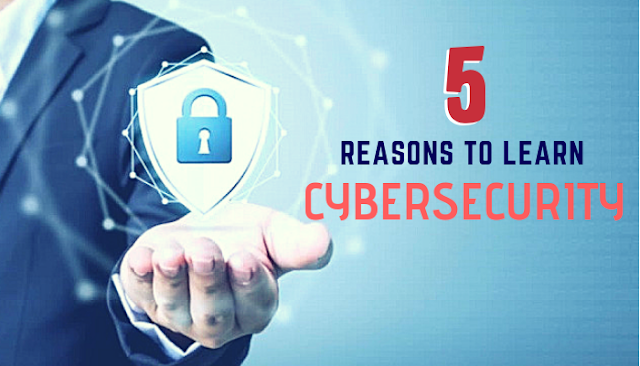Top 5 Reasons to Get a Cyber Security Certification
There was a time when a career in IT was restricted to
mainframe computers and network support. IT professionals were responsible for
ensuring technology worked perfectly within their companies so employees could
get their jobs done without glitches. Those days seem like classical history
now, as the field of IT has increased to cover many tasks and roles.
Protecting enterprise data and infrastructure has become one
of the most vital roles of IT thanks to the rise of cyber-attacks. We carry
vast quantities of sensitive data digitally as transactions are made, and we
store, even more, creating utter gold mines for hackers who want to steal
valuable information, commit denial-of-service attacks, or create havoc
The need for professional with cyber security skills is far
surpassing the number of qualified applicants, establishing a career in this
field is worth considering.
Cyber Security as the New Frontier in IT
Although it has one primary goal protecting networks,
computers, programs, and data from damage, attack, and unauthorized access,
this field is made up of technologies, processes, and practices working
together. It is sometimes applied to an information technology security, or IT
security because the IT department owns the task of protection and defence.
Cyber security is needed in every domain, from the government
to corporate, financial to personal, military to medical, because each one
collects, stores, and transmits data, much of which is delicate information.
Remember to the Equifax data breach, and you will realize how far-reaching the
effects of a cyber-attack can be the personal information of almost half the
population of the United States was compromised during that attack.
There are several cyber security Certifications to choose from, including:
- The CompTIA certification is the right choice if you are new to the field. With this certification, you will be able to get your foot in the door with a tech support job to start with.
SY0–501: Security+
- Certified Ethical Hacker (CEH) certification, which will help you understand advanced concepts such as viruses, corporate espionage, and reverse engineering.
312–50: EC-Council Certified Ethical Hacker
- The CISSP certification, the gold standard in the field of information security. This certification will prepare you to become an information assurance professional who defines all aspects of IT security, including architecture, management, design, and controls. Most IT security positions need or prefer a CISSP certification.
CISSP: Information Systems Security Professional
- The CISA certification will teach you the skill sets you will need to control and govern the information technology for a business, as well as how to execute an effective security audit in any company.
CISA: Information Systems Auditor
1) The Market for Cyber Security Professionals Is Strong
In just the first six months of 2017, 919 reported data
breaches were comprising 1.9 billion data records. That’s 163 percent higher
than 2016, and that number does not cover data breaches that were not reported.
The development in both data and attacks has created a strong
demand for skilled professionals in this domain. It is predicted that we will
need 6.5 million cyber security professionals by 2019, and we will have 3.5
million unfilled cyber security jobs by 2021. The number of cyber security jobs
is increasing three times faster than other tech jobs.
If you would like to move into a career with plenty of demand
and job opportunities, you should be considering a cyber-security
certification.
Read: How Much Can a Certified Ethical Hacker Earn?
2) Its a Field of Consistent Change
Hackers constantly look for new techniques to breach
defenses, which means this is a field of constant change. The WannaCry and
WannaCry 2.0 ransomware attacks are proof of the speed and complexity of cyber
threats today. If you are looking for a job that’s never boring and challenges
you with many opportunities for constant learning, consider a cyber-security
certification.
3) Doing Good Work While Making Good Money
How many jobs give the kind of high pay and overwhelming
challenge as cyber security? As a trained professional in this field, your job
will be to keep data, consumers, and organizations safe. U.S. News and World
Report rank Information Security Analyst job number 7 out of the ten best
technology jobs of 2017. Entry-level professionals who have obtained
certification can make close to $66,000 in their first job. The median annual
salary is $91,000, with higher wages paid in tech hubs like San Francisco. CISO
can earn upwards of $1 million.
Read: Top 10 Benefits of CISSP Certification
4) Seek New Opportunities
Cyber security also offers mobility to those who pursue
certification in this domain because the jobs are so plentiful. If you would
like to move to somewhere new, chances are you will be able to find work in
this field. Salary potential fluctuates from one city to the next. Check these
15 United States cities with the highest wages for cyber security
professionals.
5) Easy to Move into This Field
Becoming a cyber-security professional doesn’t require going
back to school for a 4-year degree or years of hands-on experience. You can get
started in this growing field with some IT knowledge and related cyber security
certifications. If you are already a specialist in IT, certification in this
field can open up new career possibilities for you. Jobs in this domain involve
Security Auditor, Computer Security Engineer, Forensics Expert, and Chief
Information Security Officer.
Read: 5 Essential Tips for Passing the ISACA CISA Exam
A steady job market, constant challenge, good pay, and ease
of entry are only a few of the compelling reasons to obtain your certification
and make a move into this lucrative and exciting career. Even if you are
working full-time in another position, the progress into this expanding field
can be made with the help of online cyber security certifications so you can
reach your goals on your own time.




Comments
Post a Comment